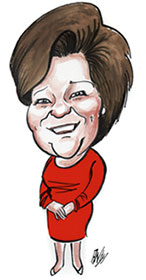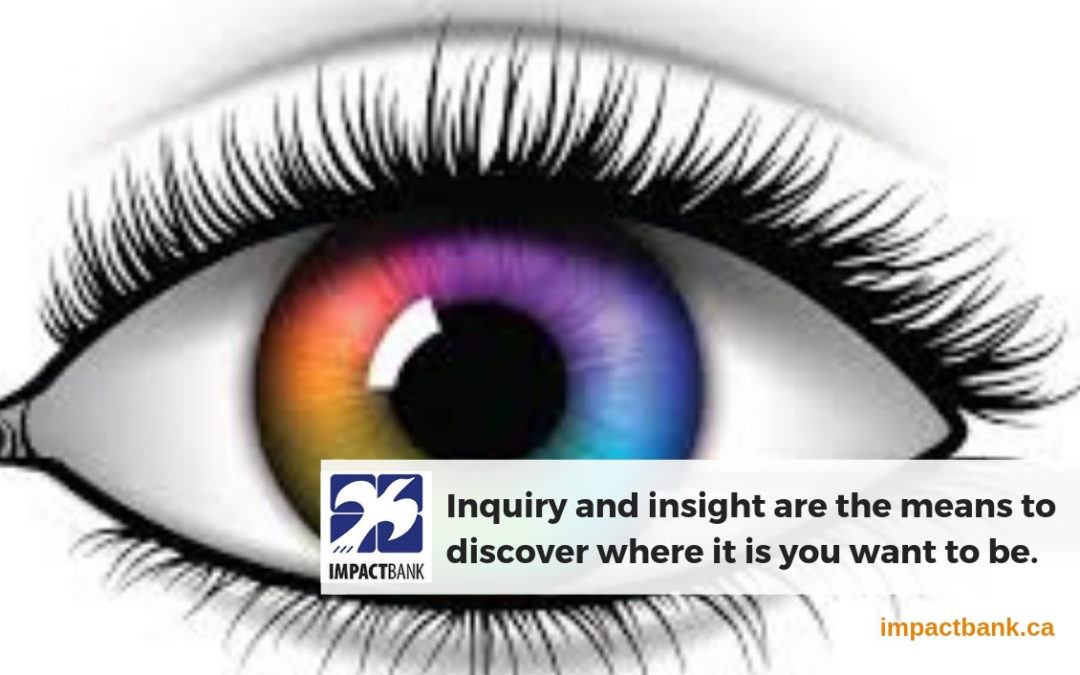Arriving at the answer feels good. That said, it’s not in the answers that you discover where you want to be. Instead, consider a practice of inquiry that values reflection and insights that open up doors and windows of thought and possibility.
This week’s Wednesday video (posted on Instagram and LinkedIn on February 6th) contains a story in which my professor failed my paper because I didn’t acquiesce to pressure intended to limit my lines of inquiry. My podcast episode (dropped on Monday the 4th) focuses on the importance of designing a process to expand your approach. The episode does offer three areas of reflection to help you start. The weekly newsletter expands on the video story and the importance of applying wisdom in the process of discovering your purpose. This blog post elaborates on the three areas mentioned in the podcast episode, reflects on the source of insights and links it to setting and achieving goals.
Inquiring Minds
When seeking purpose you’ll be well served by opening up many lines of inquiry. In fact, building a practice of curiosity is essential to living a life of meaning. Too many people though, seem to approach it much like Alice in Wonderland.
“Cat: Where are you going?
Alice: Which way should I go?
Cat: That depends on where you are going.
Alice: I don’t know.
Cat: Then it doesn’t matter which way you go.”
― Lewis Carroll, Alice in Wonderland
Alice may be described as aimless or lost. I wonder if she’s just seeking her purpose like many of you are. Like we all are. I agree with Cat, when you don’t know where you want to go, the direction doesn’t matter. Just the same, I recommend that when you are lost it can be one of the most exciting and potent times of your life. Unfortunately, too many of you rush to find a destination, thinking anywhere is better than not knowing. My clients efficiently and effectively remind me that anywhere is far from satisfying. I know this from my own life experience but it’s interesting to learn how widely shared this experience really is.
Lines of Inquiry
The quote from Alice and Wonderland may capture perfectly how many of you feel sometimes. On the flip side of lost, being purposeful, is to be determined, resolute and intentional. As this quote suggests, a goal to direct your energy may be useful. Most human beings feel better once they can take action. Before deciding on a goal worthy of focusing your efforts though, you may find an experimental approach is a great place to start. It’s action oriented while opening you to learning and possibilities rather than taking a stand or choosing a definitive direction.
A line of inquiry is a process; an ordering of your thoughts. You may want to design a process that supports a systematic and regular check-in as you go through your career. A wise leader uses a process to guide a team or a business so why wouldn’t you have one to guide your own investment of resources. In the podcast episode I shared three ways you can begin this process for yourself. When you are ready to engage someone as a sounding board or coach to help you dig more deeply, let me know.
Take stock
Gain Clarity – Self-Awareness
Practice Questions
Where do Insights come From?
First, what makes someone insightful? An insightful person is capable of deep insightful thinking. To be insightful you are willing to look inside something, anything, and find what others aren’t seeing. This includes looking inside yourself and even your experiences to find that which will help you be more self-aware.
Where to Look Within
In my work holding space with clients, I find insights come from the least expected moments. There have been times when I think a question I’ve posed for reflection has such a powerful impact that the client will refuse to continue to work with me. They appear to be so overwhelmed by the soft spot the question exposed that they clam-up. To my delight, in every case so far, the client, in one way or another and at different times in the process, admits that moment was a very significant turning point for them. In other words, being too cautious and safe can limit your insights and your growth.
That said, as you get started without a coach I suggest you look at three elements in yourself to poke for insight. First, your cognitive processing. What do you tend to get stuck on in your thinking? Are there patterns that drive your mind in circles? Do you get hung up on certain problems that leave you in fuzzy thinking? Second, your heart. It’s the most resonant part of your being. When do you feel heart ache? What touches you emotionally and what makes you feel compassion for or connected to people? Thirdly, your gut which incorporates physical insights. When does your stomach churn or become overly active? Where in your body do you experience pain or anxiety or joy or purpose? There is overlap in the three but try to separate them periodically to examine each since the type of insights each generates may be useful in building a full picture.
Insights as Discovery
Have you ever described an insight as an “a-ha experience”? Well it turns out that German psychologist and theoretical linguist Karl Buhler coined the German word aha-erlebnis to specifically describe a moment of insight. Until I read this great reference, my favorite description of the “a-ha” experience was credited to Einstein who talked about having his greatest insight and revelations while relaxing and simply focusing his attention on some process like the sound of a street car or train moving along the tracks.
Insight, while aided by systematic inquiry, may feel like finding an answer. Insights are possible when you give yourself over to a process of learning rather than a desired outcome. When you are engaged in open discovery you are vulnerable and conversely, strong. Vulnerable because in the state of discovery you may find old ways were wrong or undesirable even as your sense of self, your values, beliefs, and character, are being strengthened. Vulnerable because when stretching yourself you’ll feel lost and unsure of yourself and yet, in this feeling of weakness you are generating greater strength.
Insight to Goals
A series of insights may help you ultimately identify possible goals. Choosing one to experiment with is important. This goal can be your overall purpose in life; but on a smaller scale, this can apply to periodic professional or personal goals. For example, do you want to feel more confident in your ability to contribute to a team at work or lead a team to achieve great things? Commit to that goal, come up with an experiment to build and test your skills. Then be purposeful about engaging your lines of inquiry and expand your insights.
Guard against being Intolerant and rigid in achieving your goal. Being focused on achieving a goal drives achievement, but when overused to the point of excluding new insights, ideas and approaches, being purposeful turns into intolerance. So while cutting out superfluous noise may be important to focus, it’s also important to balance that out with a dash of openness to information, ideas and suggestions so the goal you are working on so diligently is still relevant when you reach it.
How We Can Walk together…
In April 2018 I brushed up against a call for meaning; and insight of sorts. It ultimately moved and inspired me to shift the focus of my practice. I’m walking with 30 to 35 year old’s who are in a pivotal spot in your life and career. Whether you’re HERE by age or spirit, I want to walk with you! Are YOU ready to do some self exploring & finding the real meaning of your life? The research suggests you’ll embrace your inner REBEL in your 20’s and that most of you slip quietly into ACCOMMODATOR in your 30’s. Learning this grabbed my attention and my mission was clear. Moreover, I intend to bring out your inner rebel so you can make the difference you really want to make in the world.
In June 2018 I took a course in story telling. I was intent on finding my “Big Why” for shifting my practice. Ultimately, I landed on my story. It spans from my childhood, with a pivotal point in my early 20’s finally culminating in a significant career turning-point at the age of 37. This is the story that illuminated my purpose. In fact, remembering the moment of insight supports my efforts when this transition is difficult. It adds meaning to the work I’m currently doing. Listen below…
Is finding purpose and meaning in your life and in your career important to you?
Are you ready to unpack the tough stuff so you can find your north star?
Is your career all that you want it to be and more? If you answered yes to this last one, I’m so happy for you. Don’t you want that for everyone you know? THEN, pass on my message to everyone in your network in case it resonates for them.
Want to learn to #unpack4impact? Willing to do the work to search for meaning?
Once you have the skills to unpack the emotions and barriers and triggers and mindset challenges with the skills in my system, you’ll begin to see the impact in your career and you’ll find what matters most to you. Join me…
My goal is to make my system accessible and affordable. There are many ways you can engage with me….here are THREE to get started, without spending a dime.
- REGISTER for an ASK ROX RoundTable… TWO 50 minute engagements on ZOOM per month limited to 12 participants in each.

- BOOK a complimentary exploratory conversation 15-20 minutes.
- SUBSCRIBE to my mailing list from my home page, receive an interactive exercise helping you cope with stress, and a weekly reflection.
Of course I’d love to work with you, your team or organization so…
- Book me to speak at your conference or to a group in your organization. My workshops on building resilience, improving relationships, and increasing performance are popular.

